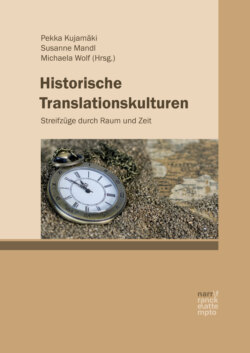Читать книгу Historische Translationskulturen - Группа авторов - Страница 39
3.2 Scottish Gaelic
ОглавлениеIn the nineteenth century, many publications and translations of Scottish Gaelic texts were inspired by a “hunt for oral and literary ‘remains’ to prove/disprove Macpherson’s Ossianic translation” (Constantine 2009: 302). As previously mentioned, the Macpherson translation of Scottish Gaelic tales, while highly acclaimed after its publication, was greatly doubted concerning its authenticity by contemporary writers and scholars. This endeavour resulted in a high demand for Gaelic tales and legends (Gillies 2000: 182). As a consequence, a number of anthologies containing English translations of folk tales written in Scottish Gaelic were published during the second half of the nineteenth century such as Archibald Campbell’s Waifs and Strays of Celtic Tradition (1889–1895) and Rev. Alexander Cameron’s Reliquiae Celticae (1892–1894) comprising bardic eulogies and elegies. This trend in combination with the political unrest caused by the Highland Clearances fostered the Scottish Gaelic literary revival happening at the end of the nineteenth century (ibid.). Another contributing factor was the increasing cultural contact but also solidarity between speakers of Scottish Gaelic and Scots due to the large influx of Gaelic-speaking settlers in Lowland Scotland (Thomson 2000: 487). As Gillies points out, “Gaelic-Scots solidarity, and to some extent pan-Celtic outreach, dictated that English translations would play their part in this revival, to a greater extent than occurred in Ireland or Wales” (Gillies 2000: 182). For example, Scottish Gaelic poets had become used to preparing an English translation of their work for mixed audiences of speakers of Scottish Gaelic, Scots and English (ibid.: 182–183).
This development, which continued into the twentieth century, was also encouraged by the increasing scholarly interest in Scottish Gaelic literature. Celtic had become a university subject at the end of the nineteenth century which resulted in the publication of a series of scholarly books on Scottish Gaelic poetry and folk tales including their English translations (Thomson 2000: 487) such as Nigel MacNeill’s The Literature of the Highlanders (1892) or Magnus Maclean’s The Literature of the Highlands (1904). Important anthologies of the early twentieth century include Alexander Carmichael’s Carmina Gadelica (1900), a large collection of runes, hymns and incantations charms with accompanying translations, Songs of the Hebrides (1909) edited by Marjory Kennedy Fraser and Rev. Kenneth MacLeod as well as The Gaelic Songs of Duncan Macintyre (1912) edited and translated by George Calder.
Many of the translations of the time were written in metrical format (Thomson 2000: 487) as an attempt to convey the antiquity of the original texts (Gillies 2000: 182). Some are linguistically inadequate, or their content was altered in different ways. A possible explanation for these (re-)translations during that period, not only in Scotland but also in the other English colonies in the British Isles, was that they were an attempt to rectify certain images disseminated by original texts or translations written by the hegemonic power. As Tejaswini Niranjana puts it: “By employing certain modes of representing the other – which it thereby also brings into being – translation reinforces hegemonic versions of the colonized” (Niranjana 1992: 3). (Re-)Translating texts was seen as a way to promote the self-image of the colonized people.
| Scottish Gaelic – Overview What was translated: – More common to translate out of Scottish Gaelic – Mainly anthologies: poetry, tales and legends Reasons for translation activity: – Revive Scottish Gaelic literature and culture – Disseminate Scottish Gaelic literature and culture in Scotland and internationally – Recreate the image of Celtic culture – Scholarly interest in Celticism Translation strategies: – Metrical translations – Use of archaisms to replicate antiquity and supposed mysticism of original texts Translators: – Alexander Cameron – Alexander Carmichael – Scholars – Clergymen Aims/Outcomes: – Scholarly interest in Celticism – Interest in contemporary Celtic culture |
